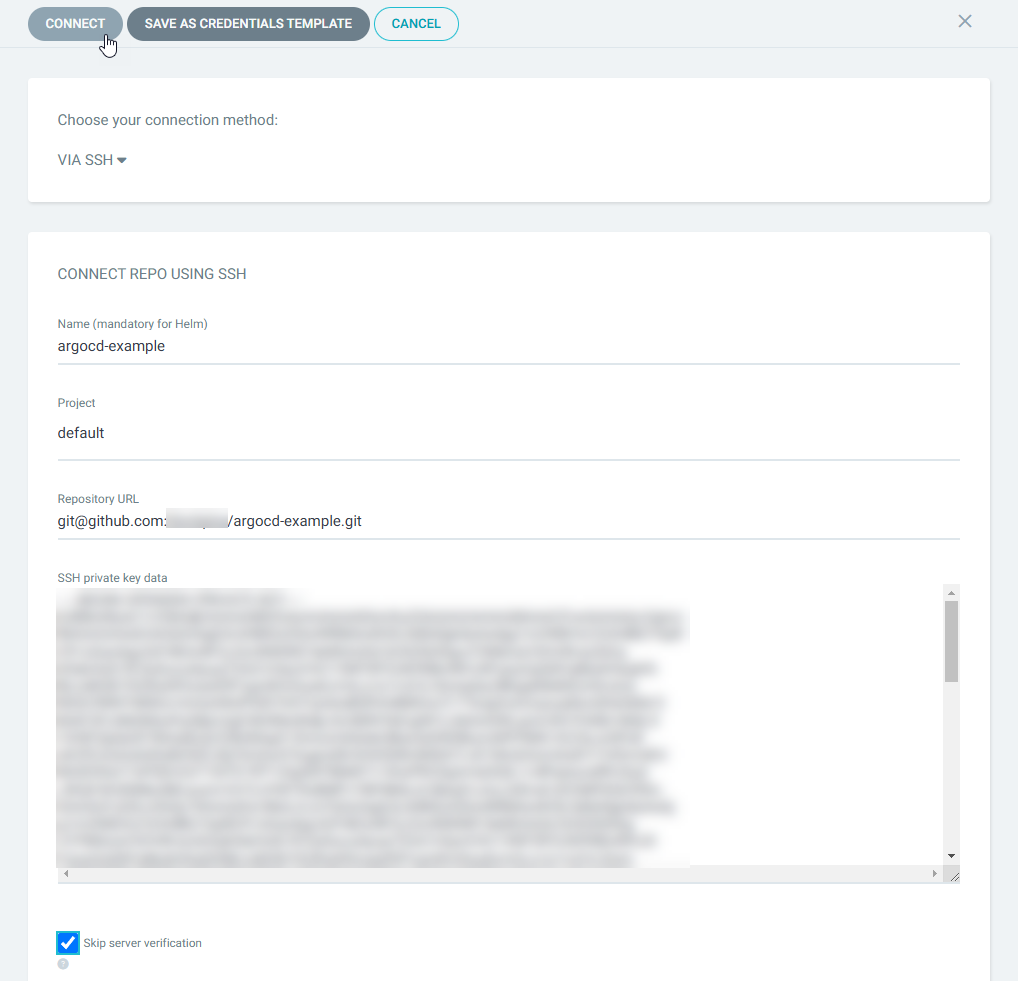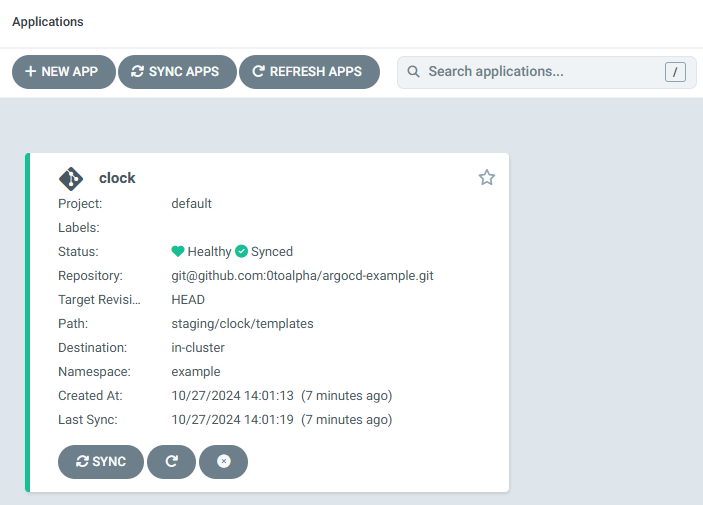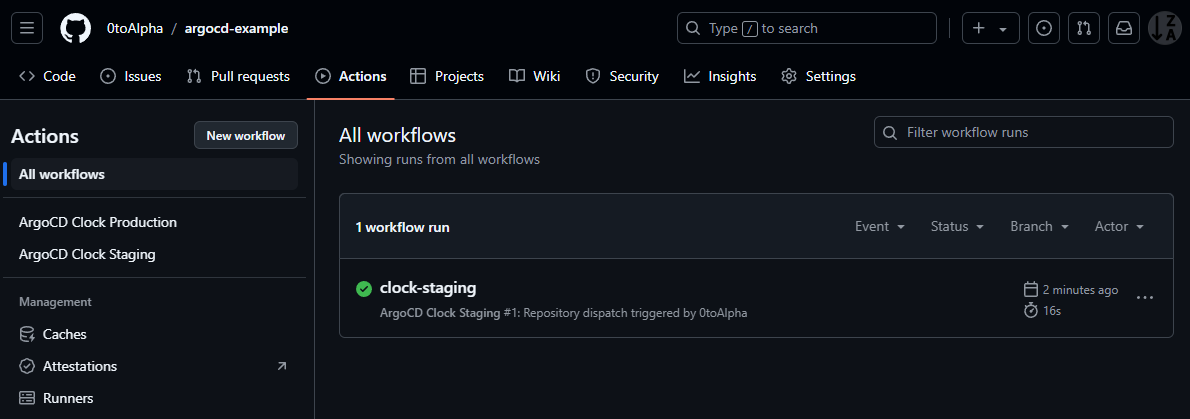ArgoCD
We've gone a long ways now to having builds which we can use and deploy on Kubernetes. It's been a journey but we are almost there. Now we will use ArgoCD to automatically deploy our builds.
GitHub Manifest
Code
Before we start, we need to create a GitHub repository to house our argocd manifest. We will create one called argocd-example.
We want to have the following directory structure:
.github
workflows
clock-staging.yml
clock-production.yml
staging
clock
application.yaml
templates
deployment.yaml
production
clock
application.yaml
templates
deployment.yaml
For this repository, you don't necessarily need a develop branch. GitHub will do most of the automation work so having a single main branch is fine.
Repository Settings
To ensure git actions will run, make sure you have "Allow all actions and reusable workflows" checked as well as in Workflow permissions have "Read and write permissions".
Application Templates
The application.yaml file, tells ArgoCD how to run the application deployment. It has information to notify argocd-notifications to push updates to Slack. Keep in mind a few things:
- You should replace repoURL with your own username, I'm only using mine as an example.
- On your Kubernetes cluster, you should have a namespace created called example.
apiVersion: argoproj.io/v1alpha1
kind: Application
metadata:
name: clock
namespace: argocd
annotations:
notifications.argoproj.io/subscribe.on-sync-succeeded.slack: staging
notifications.argoproj.io/subscribe.on-sync-failed.slack: staging
notifications.argoproj.io/subscribe.on-sync-status-unknown.slack: staging
notifications.argoproj.io/subscribe.on-health-degraded.slack: staging
notifications.argoproj.io/subscribe.on-deployed.slack: staging
spec:
project: default
source:
repoURL: [email protected]:0toalpha/argocd-example.git
targetRevision: HEAD
path: "staging/clock/templates"
destination:
server: https://kubernetes.default.svc
namespace: example
syncPolicy:
syncOptions:
- CreateNamespace=true
automated:
selfHeal: true
prune: true
Application Template
Under the template folder, we also have a deployment.yaml file. This tells argocd how to run the deployment.
kind: Deployment
apiVersion: apps/v1
metadata:
name: clock
spec:
replicas: 1
selector:
matchLabels:
app: clock
template:
metadata:
labels:
app: clock
spec:
containers:
- name: clock
image: 0toalpha/clock:v0.1.0
imagePullPolicy: Always
env:
- name: MESSAGE
value: "Hello World"
- name: AXIOM_DATASET
valueFrom:
secretKeyRef:
name: axiom
key: dataset
- name: AXIOM_TOKEN
valueFrom:
secretKeyRef:
name: axiom
key: token
- name: AXIOM_ORG_ID
valueFrom:
secretKeyRef:
name: axiom
key: orgId
resources:
requests:
memory: "128Mi"
cpu: 0.25
limits:
memory: "256Mi"
cpu: 0.5
imagePullSecrets:
- name: dockerhub
restartPolicy: Always
hostNetwork: false
Notice this is where we have our environment variables set. We still need secrets for axiom under the example namespace. Let's do it real quick again. In the staging kubernetes server, create this script while inserting the correct secrets:
example.yaml
DOCKER_USERNAME=
DOCKER_API_TOKEN=
AXIOM_DATASET=staging
AXIOM_ORGID=
AXIOM_TOKEN=
# Create namespaces
kubectl create ns example
# Delete Secrets
kubectl delete secrets --all -n example
# Axiom secrets
kubectl create secret generic axiom --from-literal=dataset=$AXIOM_DATASET --from-literal=orgId=$AXIOM_ORGID --from-literal=token=$AXIOM_TOKEN --namespace example
# Dockerhub secrets
kubectl create secret docker-registry dockerhub --docker-server https://index.docker.io/v1/ --docker-username $DOCKER_USERNAME --docker-password $DOCKER_API_TOKEN --namespace example
Run the script via:
kubectl apply -f example.yaml
Git Actions
The git actions we have written here are used to tie into the event from when the build kicked off when we tagged our commit. We want the build to come back and kick off another git hub action to replace the build number in our manifests.
clock-staging.yml
name: ArgoCD Clock Staging
on:
repository_dispatch:
types: [clock-staging]
jobs:
build:
runs-on: ubuntu-latest
steps:
- uses: actions/checkout@v2
- name: Clock Update Image Version
id: imgupd-clock-staging
uses: mikefarah/yq@master
with:
cmd: yq eval '.spec.template.spec.containers[0].image = "${{ github.event.client_payload.image }}"' -i staging/clock/templates/deployment.yaml
- uses: stefanzweifel/git-auto-commit-action@v4
with:
commit_message: Apply image ${{ github.event.client_payload.image }}
Notice the clock-staging event triggers this action.
clock-production.yml
name: ArgoCD Clock Production
on:
repository_dispatch:
types: [clock-production]
jobs:
build:
runs-on: ubuntu-latest
steps:
- uses: actions/checkout@v2
- name: Clock Update Image Version
id: imgupd-clock-production
uses: mikefarah/yq@master
with:
cmd: yq eval '.spec.template.spec.containers[0].image = "${{ github.event.client_payload.image }}"' -i production/clock/templates/deployment.yaml
- uses: stefanzweifel/git-auto-commit-action@v4
with:
commit_message: Apply image ${{ github.event.client_payload.image }}
Preparing ArgoCD Repository
Remember when we added ssh keys to GitHub? It's time to retrieve the id_rsa file.
The id_rsa file should start and end with
-----BEGIN OPENSSH PRIVATE KEY-----
-----END OPENSSH PRIVATE KEY-----
Now to go the ArgoCD Dashboard and go to Settings > Repositories

Select "+ Connect Repo"
Configure the argocd-example repo and check "Skip server verification"

Check the repo status.

Initializing ArgoCD Application
On the kubernetes server, git clone the argocd-example. Navigate to staging > clock and run the following:
kubectl apply -f application.yaml
ArgoCD Dashboard
Back on the ArgoCD Dashboard, you should now see the application being loaded.

Let's check on Axiom that it is running by checking the logs
We can open Axiom and check the logs being pushed.

Deployment Cycle
Now since there will always be updates, let's modify the code and ensure that when a new version is pushed, we will see the new container be built and pushed to the server to be ran.
In the clock code, let's modify the code. We will branch develop to feature/message. Let's modify the code to:
import dotenv from 'dotenv';
dotenv.config();
import logger from './logger'
const {
MESSAGE
} = process.env;
logger.info('Version 0.2.0.');
setInterval(() => {
logger.info(`${MESSAGE}: ${new Date()}`)
}, 60000)
We will write the version to log so it will show in Axiom and push the logs to every minute.
Reviewing Steps:
- Commit feature.
- Create pull request to develop.
- You can watch in the pull request that a test build is done on the pull request.
- Once all checks are done and we are happy with the code, merge pull request.
- Create a tag on develop called v0.2.0 and push the tag.
- On GitHub > Actions, we can watch the build on v0.2.0.
- Once the build has been completed, it will trigger the version update on GitHub repo argocd-example. We can check the code and see that the version has updated.
Notice in argocd-example Actions, you can see the git action ran.

If you check the staging deployment.yaml file, you will notice the version has updated
kind: Deployment
apiVersion: apps/v1
metadata:
name: clock
spec:
replicas: 1
selector:
matchLabels:
app: clock
template:
metadata:
labels:
app: clock
spec:
containers:
- name: clock
image: 0toalpha/clock:v0.2.0
...
If you go to ArgoCD, select your application and the pod, you can view the logs. Notice the version output.
